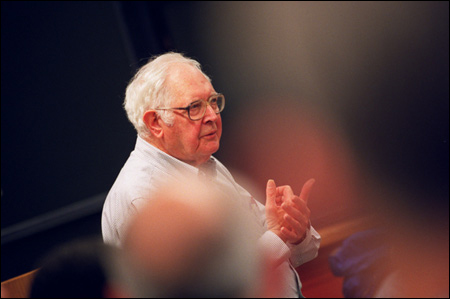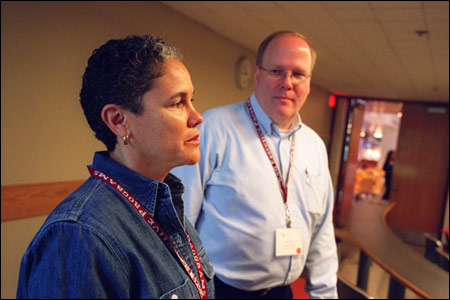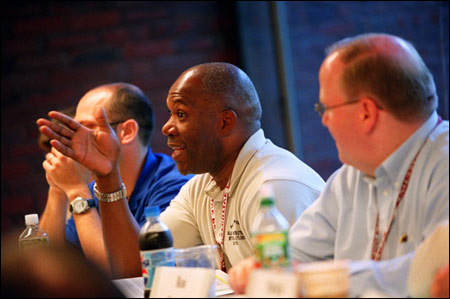Leadership Institute in third year
Fellows provide perspective of gay, lesbian community in executive education program

New York State Sen. Thomas K. Duane’s three weeks at Harvard in February were among the richest he can remember.
Duane called the intensive executive education experience “rejuvenating” and “amazing.” And Duane’s presence may well have ensured that the experience was just as rich – or richer – for his classmates.
Duane, the first openly gay, openly HIV-positive member of the New York State Senate, was a Gay and Lesbian Leadership Institute Fellow at the John F. Kennedy School of Government’s Senior Executives in State and Local Government Program.
The executive education program brings together more than 50 officials from across the nation and around the world for three intensive weeks of thought, discussion, and leadership training. Program participants are talented, committed public servants, but organizers say that adding Leadership Institute Fellows to the mix not only broadens the diversity of the participant body, it puts issues important to the gay, lesbian, bisexual, and transgender community on the table along with other important government priorities.

“For this program to reflect the outside world, we need gays and lesbians,” said Marty Linsky, adjunct lecturer at the Kennedy School and the program’s faculty chair when the fellowship program was begun three years ago. “What goes on here mirrors what goes on in the world. To the extent that we can mirror it accurately, the better the program is for everyone.”
The latest session began on Sunday (June 13) and runs through early July. Though the Leadership Institute Fellows provide representation of gay and lesbian senior executives and elected officials in the program, the program itself isn’t designed specifically as a forum for issues particular to the gay and lesbian community.
Instead, the curriculum deals with general issues important to leaders in state and local government, including evaluating policy, organizing and marshaling resources, and devising strategies to attain meaningful, achievable goals.
Invariably, however, gay and lesbian issues do come up, providing an opportunity to increase understanding of a community with which some public officials have very little experience.
“I think that having openly gay and lesbian people in the class was life-changing for many of the other participants,” Duane said. “I think it opened their eyes to a unique experience that a large number of Americans have in our society. I think the depth of the interaction among us enriched their views in ways they hadn’t experienced in their day-to-day lives.”
The extent to which gay and lesbian issues come up varies from session to session. Last July, they were frequent enough that by the end of the three weeks some program participants accused fellows of hijacking the program’s agenda. But Linsky said that example is just one way the program has mirrored the outside world and is forcing participants to confront their own issues, both personal and professional, on the subject.

“They have become a force within the group, as a cohort. That has changed the dynamics in the room,” Linsky said.
In addition to raising the awareness of their colleagues, the Leadership Institute Fellows are also there to improve their own skills. Fred P. Hochberg, dean of the Milano Graduate School at New School University in New York and a driving force behind the fellowship’s creation, said the gay and lesbian community is badly underrepresented among the ranks of elected officials. There are just 275 openly gay officials among 531,000.
“It’s unbelievably small relative to any measurement, any benchmark,” Hochberg said. “It’s important to have people who really represent the full spectrum of society in elected office.”
Hochberg attended the Kennedy School program in 1996. He said the experience he had there prompted his work to establish the fellowship.
Chuck Wolfe, president and chief executive officer of the Gay and Lesbian Leadership Institute, which sponsors the fellows, said the program has gotten positive feedback for the three years it’s been up and running. The institute has increased the number of fellows it’s sent to Harvard each year, starting with three, then seven in the program’s second year. This year it funded 10 fellowships.
Ron Forsythe, the police chief of Suisun City, Calif., and one of this session’s Leadership Institute Fellows, said he’s at Harvard to improve his leadership skills first and foremost. He said the law enforcement community has a long way to go toward accepting gay and lesbian officers and said he expects there will be ample opportunities in the coming weeks to share his perspectives.
Mirian Saez, who holds positions on a Pennsylvania Housing Authority and on the District of Columbia Board of Education, is serving as a Fannie Mae Foundation Fellow and is also supported by the Leadership Institute. Saez said she was frank about her sexuality with those in her first small group session because she wanted the group members to understand her perspective as they interact.
Darryl Moore, a board member of California’s Peralta Community College District and the third fellow, said in the three days since Sunday’s orientation, he’s already had the chance to discuss same-sex marriage and the relationship between New York’s African-American gay community and the spread of AIDS.
“We’re breaking down the stereotypes [held by] people in the room,” Moore said.




